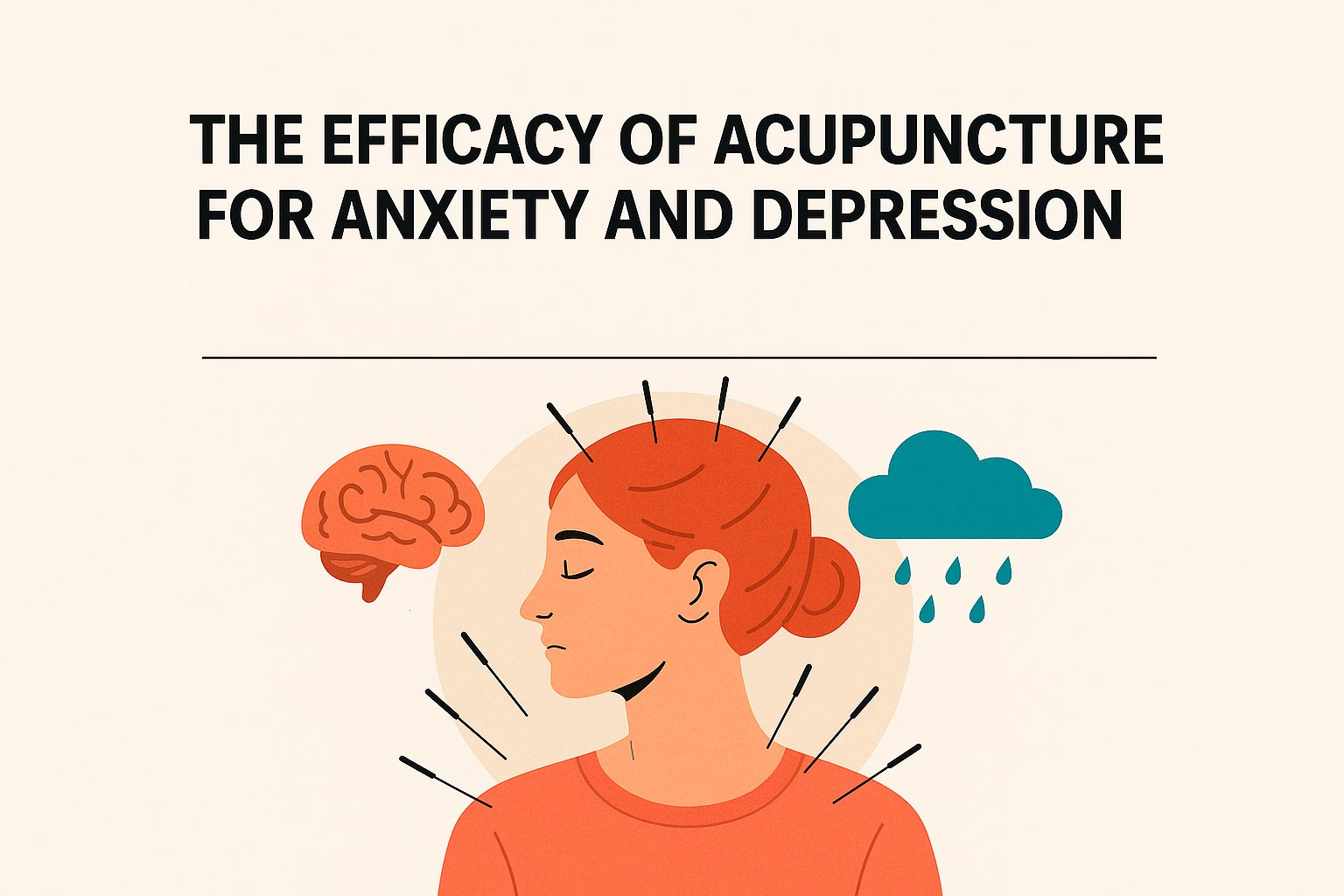🔶 Introduction
Anxiety and depression are among the most common mental health disorders worldwide, affecting millions of people each year. These conditions can severely impact an individual’s quality of life, causing physical, emotional, and psychological distress. While conventional treatments such as medications and therapy are commonly used, Traditional Chinese Medicine (TCM) offers an alternative or complementary approach through acupuncture.
Acupuncture, a key therapeutic modality in TCM, has gained increasing recognition in modern medicine for its ability to help manage symptoms of anxiety and depression. This article explores the scientific research behind acupuncture’s efficacy in treating these mental health conditions, its mechanisms of action, and its integration with conventional treatment.
🔶 The Role of Acupuncture in TCM
In Traditional Chinese Medicine, mental health is deeply connected to the flow of Qi (vital energy), and imbalances in the body’s Qi, Blood, Yin, and Yang can contribute to emotional and psychological disorders. Acupuncture aims to restore balance and harmony by stimulating specific points on the body, which helps regulate the flow of Qi and adjust imbalances in internal energy.
1. Qi and Mental Health
- Liver Qi stagnation is often linked to symptoms of irritability, frustration, and stress, all of which are common in both anxiety and depression.
- Spleen Qi deficiency is associated with fatigue, lack of motivation, and feeling of heaviness, often observed in depressive states.
- Kidney Qi deficiency can lead to feelings of fear, anxiety, and insecurity, particularly in patients with chronic anxiety.
2. The Role of Acupuncture in Restoring Balance
Acupuncture helps:
- Regulate Qi and restore its flow through the body, alleviating stagnation and improving emotional well-being.
- Nourish Blood and Yin, which are often deficient in patients with chronic stress and depression.
- Calm the Shen (spirit), which is crucial in treating mental health conditions in TCM.
🔶 Mechanisms of Acupuncture in Treating Anxiety and Depression
Recent research has shed light on the mechanisms through which acupuncture affects the brain and body to alleviate symptoms of anxiety and depression.
✅ 1. Regulation of Neurotransmitters
Acupuncture has been shown to influence the levels of key neurotransmitters in the brain, including:
- Serotonin: Often called the “feel-good” neurotransmitter, it plays a major role in mood regulation. Studies show that acupuncture can increase serotonin production, helping alleviate feelings of sadness and anxiety.
- Endorphins: These are the body’s natural painkillers and mood boosters. Acupuncture stimulates the release of endorphins, contributing to a sense of well-being and relaxation.
- Dopamine: Acupuncture helps to regulate dopamine levels, which are linked to motivation, pleasure, and reward, factors often disrupted in depression.
✅ 2. Regulation of the Autonomic Nervous System (ANS)
The autonomic nervous system controls involuntary bodily functions, including heart rate, digestion, and respiratory rate. Acupuncture has been found to:
- Balance the sympathetic (fight-or-flight) and parasympathetic nervous systems (rest-and-digest), helping to reduce stress and improve emotional regulation.
- Lower cortisol levels, the hormone responsible for stress, reducing overall tension and anxiety.
✅ 3. Reduction of Inflammation
Chronic inflammation is increasingly recognized as a contributing factor to mental health disorders, particularly depression. Acupuncture:
- Reduces inflammatory markers and regulates immune function, potentially improving mood and mental clarity.
- Regulates cytokine levels, which are involved in immune responses and can affect mental health.
🔶 Clinical Evidence Supporting Acupuncture for Anxiety and Depression
✅ 1. Anxiety Disorders
Several studies have shown acupuncture’s effectiveness in treating various forms of anxiety, including generalized anxiety disorder (GAD), social anxiety, and panic disorder.
- A study published in The Journal of Alternative and Complementary Medicine (2017) found that acupuncture significantly reduced anxiety symptoms in patients, with lasting effects observed even after the treatment had ended.
- Another systematic review and meta-analysis, published in Acupuncture in Medicine (2018), concluded that acupuncture had a moderate positive effect in reducing anxiety, particularly when combined with other forms of therapy.
✅ 2. Depression
Acupuncture has also been studied as a treatment for depression, often with promising results:
- A clinical trial in The Lancet (2015) showed that acupuncture, when combined with conventional treatment, was more effective in reducing depression symptoms compared to conventional treatment alone.
- Acupuncture has been shown to have similar effects to antidepressant medications in some cases, but with fewer side effects and lower risk of dependency.
✅ 3. Combined with Conventional Treatment
Acupuncture is often used alongside cognitive behavioral therapy (CBT), medication, or other forms of treatment to enhance outcomes. The integration of acupuncture with conventional therapy can lead to:
- Improved symptom relief and faster recovery.
- Reduced side effects from medications, such as those associated with antidepressants or anxiolytics.
🔶 Acupuncture Points for Treating Anxiety and Depression
The selection of acupuncture points for treating anxiety and depression depends on the individual’s specific symptoms, constitution, and underlying imbalances. However, several points are commonly used to regulate the Liver, Spleen, Kidneys, and Heart to alleviate anxiety and depression:
| Acupuncture Point | Location | Function |
|---|---|---|
| HT7 (Shenmen) | Wrist, near the base of the thumb | Calms the Shen, reduces anxiety, and improves sleep |
| LI4 (Hegu) | Between the thumb and index finger | Relieves pain, promotes relaxation, and balances emotions |
| ST36 (Zusanli) | Below the knee | Tonifies Qi, strengthens the body, and reduces fatigue |
| LV3 (Taichong) | Foot, between the first and second toes | Moves Liver Qi, alleviates irritability, and relieves emotional stress |
| GV20 (Baihui) | On top of the head | Calms the mind, relieves stress, and clears the mind of negative thoughts |
🔶 Conclusion
Acupuncture is a valuable tool in the treatment of anxiety and depression, offering a holistic approach that addresses both the mind and the body. By regulating Qi, improving neurotransmitter function, and balancing the autonomic nervous system, acupuncture has been shown to provide significant relief from the symptoms of mental health disorders. Whether used alone or as an adjunct to conventional treatments, acupuncture offers a safe, effective, and natural alternative for those struggling with anxiety and depression.


发表回复